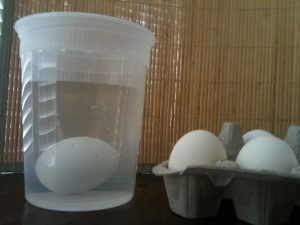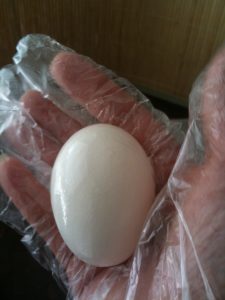This post is by Bernie Carr, apartmentprepper.com
I like eggs for breakfast, especially “over easy” eggs. Dehydrated eggs are great for scrambled eggs but I have not found a dehydrated egg product that can make eggs over easy.
After a bit of research, I found out that making eggs last longer is very easy. All you really need are fresh eggs and mineral oil. Mineral oil is found in the first aid section of a pharmacy or even the grocery store, next to stomach remedies.
Here are the steps that I took:
- I found out that you can check an egg’s freshness by dropping it in a jar of water. If it sinks, then it is fresh. If it floats then it is no longer fresh. So I tested the egg prior to oiling it.

2. I dried the egg and put on some gloves.
3. I poured about a quarter size amount of mineral oil into my palm and rubbed it all over the egg, and repeated the process on six eggs.
That’s it! I am leaving the eggs on the counter and I will check them weekly. I will turn the container over once a week to ensure the coating stays even. I am not sure how they will turn out. It is starting to get humid and warm around here. With air-conditioning, the temperature in the kitchen is around 75-78 degrees. I will test the eggs for freshness in two weeks. In the meantime I will do some more research on other ways to preserve eggs such as pickling etc.
I will definitely keep you posted!
Update after two months: So far the eggs are still fresh. No unpleasant odors or changes; I tested one and it sinks to the bottom of the cup of water so it is still good.



I heard that you have to leave them upright and then turn them once a month. I saw it on line. Check it out and see what you find. I am going to try this as soon as I get to the farmers market. Thanks Bernie.
I will make sure my eggs are sitting upright, and will turn them once a month. I need to find a farmers market too. Thanks Clarissa!
I have been to farmers market at rice university before. They usually have an egg vendor, check it out it’s from 3:30 pm to 7 on Tuesday’s. It’s in the south stadium lot so you enter off of university. I dont know what part of town you live but I love close by so it is great for me.
Hi Patrick, Rice is accessible enough, within a 20 min drive from work. I may go check it out. Thanks for the tip!
One suggestion I would make: If you plan to store your eggs in an eg carton, you might want to look for plastic or styrofoam cartons. I would be concerned that a cardboard carton might absorb some of the oil, thus negating your efforts. Using a carton will make it easier to flip the eggs, as you can simply flip the entire carton, rather than flipping each egg.
Hi David, Good suggestion-using a non-cardboard carton makes sense as the cardboard would just absorb the oil. Thanks!
Your concern about fresh eggs may be valid as farm fresh unwashed eggs will still have what is called the “bloom” from when they were laid. It’s what’s keeps it fresh while the embryo grows into a chick. This part of the egg is obviously washed off during the processing for store bought eggs. I’m not sure if that will effect how well they can be preserved in this manner, just something you may want to check into.
Hi Brad, Good point about the “bloom” According to the egg preserving articles I saw, the mineral oil coating replaces the bloom allowing the egg to last longer. Thanks for the comment!
They used to do this in the eighteenth century but they buried the eggs in ashes as well. Check out this blog post here: https://thebuzzatthehive.blogspot.co.uk/2011/10/preserving-harvest-fresh-eggs.html
Hi renna, I followed the link you sent-very interesting that they mentioned lard as the coating, and buried the eggs in ashes. I happen to have some lard, so I may include lard coated eggs as well. Thank you for commenting and including the link!
I suspect than any type of oil would do really. Like David below says, the coating is intended to reduce the shell’s permeability. By restricting the flow of molecules, mainly oxygen in this case, the chemical processes that contribute to the egg’s aging is slowed. I wonder if maybe the ashes add a certain level of protection from micro-organisms by changing the pH to something they don’t like. Lye is highly basic and is leached out of wood ashes and so would promote a very basic environment. The two aspects of this preservation method would combine pretty well I think to keep the eggs from degrading either by processes inside the shell or by organic activity outside. This is all theoretical of course, I haven’t tried anything close to this before! I’m curious to see how your experiment turns out!
Hi renna I think various tyoes of oil coating would likely work. I didn’t use wood ash in this experiment but I am sure that would make them last longer. Can’t wait to publish results in a few weeks!
I’m pretty sure the goal overall here is to seal the pores of the egg’s selectively permeable shell (remembering sixth grade science)… Whether ashes or oil droplets, I believe the point is to close those pores preventing air from transferring through the shell. You may even be able to use talcum powder if ash works… I love eggs but I’m a bit gun-shy about eating ‘old’ eggs even if they are edible. I wonder what a two year old ‘preserved’ egg tastes like… Not sure I’ll ever find out.
Hi Jeff, I am pretty iffy about it myself, that is why I will test for freshness by checking if the egg will sink. I will have to see how preserved eggs are like-another experiment idea! Thanks!
Another egg preservation technique I remember reading about years ago was dipping the eggs in “water glass”, also known as sodium silicate. According to Wikipedia:
Sodium silicate was also used as an egg preservation agent in the early 20th century with large success. When fresh eggs are immersed in it, bacteria which cause the eggs to spoil are kept out and water is kept in. Eggs can be kept fresh using this method for up to nine months. When boiling eggs preserved this way, it is well advised to pin-prick the egg to allow steam to escape because the shell is no longer porous.
Sodium silicate is apparently also used in home brewing. It used to be available in pharmacies.
Hi David, I will have to look into sodium silicate as another method to preserve eggs. Thanks for mentioning!
Thanks for a great post on eggs. It was very informative and I’ll be trying the mineral oil trick out. I also followed your link to Preparednesspro.com so I found two great sites at the same time.
This is really good information, not just for a disaster but for everyday use.
Hi KoryN, That is what I like about acquiring these skills, we can use them for everyday life, even if nothing happens. Glad you liked the post!
I’ve always wanted to try this and check the eggs over a period of time to see how long they will last. Thanks for beating me to it!
Hi millenniumfly, Try it anyway–we may get different results! 🙂
Well girl how did they turn out ? I’ve heard of this a few years ago, but was a little unsure about it.
I do have chickens now so this would workout great when my boys get there fill of the eggs i’ll be able to start preserving them.
Just wanted to know if it was a success.
Hi Nita, It’s two months later and the egg I tested is still fresh. One thing I do is turn them over weekly. So we know they will last at least 2 months unrefrigerated with the mineral oil coating. I am sure they will last even longer refrigerated with the coating.